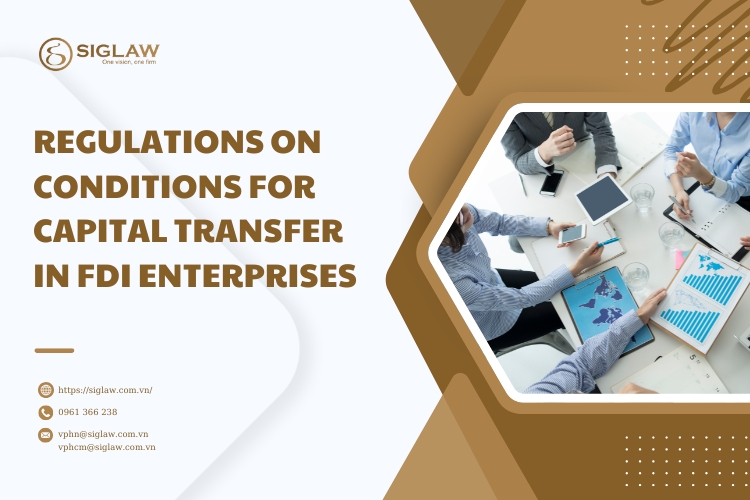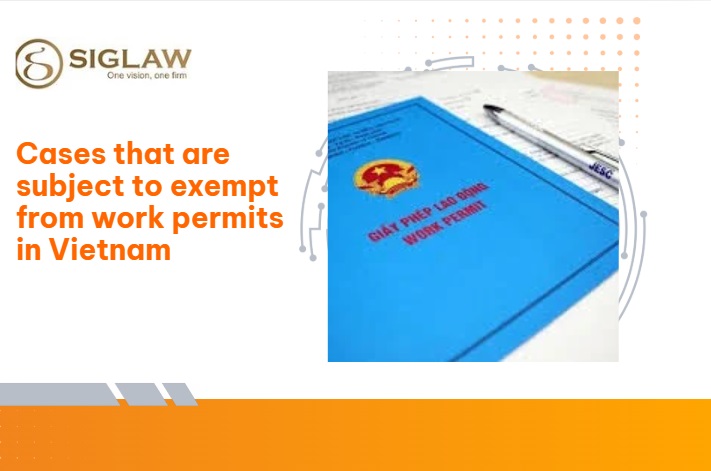Capital transfer in foreign-invested enterprises (FDI enterprises) is always a complex matter subject to strict regulation under Vietnamese law. The purchase and sale of shares or capital contributions between foreign investors and related parties must comply with various conditions to ensure transparency and protect the rights and interests of all parties involved. The following article aims to clarify the conditions and procedures governing capital transfer in FDI enterprises.
Scope of Application of FDI Capital Transfer Regulations
All types of enterprises with foreign direct investment (FDI) in Vietnam fall under the scope of capital transfer regulations. This includes limited liability companies (LLCs), joint stock companies (JSCs), joint ventures, branches, and representative offices established by foreign investors. Under the current Law on Investment and Law on Enterprises, the transfer of capital contributions or shares between foreign investors, between domestic and foreign investors, or with third parties must comply with statutory requirements. The Law on Enterprises 2020 also stipulates that, upon meeting certain conditions, foreign investors and Vietnamese individuals may enter into capital transfer agreements.

Current Legal Regulations on FDI Capital Transfer
The Law on Investment 2020 specifies conditions for foreign investors acquiring contributed capital or shares in existing enterprises. In particular, Clause 2, Article 24 of the Law on Investment requires foreign investors to satisfy conditions relating to market access (for conditional business sectors), national defense and security, and land use rights (particularly in sensitive areas). Decree No. 31/2021/ND-CP, guiding the implementation of the Law on Investment, reiterates these conditions for foreign investors purchasing shares or contributing capital to established enterprises.
Under the Law on Enterprises, the conditions for capital transfer depend on the type of company involved. For a multiple-member limited liability company (LLC), Article 52 of the Law on Enterprises 2020 stipulates that any member wishing to transfer their capital contribution must first offer it to the other members in proportion to their ownership interest, under the same terms and conditions. If the remaining members do not purchase all the offered capital within 30 days, the member may then transfer the remaining portion to a non-member.
The State Bank of Vietnam (SBV) requires that all payment transactions related to FDI capital transfers be carried out through the enterprise’s foreign direct investment (FDI) capital account. Foreign investors must open this account with a licensed Vietnamese bank, either in Vietnamese dong (VND) or in a freely convertible foreign currency, to process payments for share acquisitions or capital contributions.Failure to comply with these regulations constitutes a violation of payment and foreign exchange management rules, and may result in administrative sanctions under Vietnamese law.
Procedures for Capital Transfer in FDI Enterprises
The procedures for transferring capital contributions or shares in foreign-invested enterprises (FDI enterprises) involve multiple administrative and legal steps.First, the parties must conduct legal due diligence to review the company’s legal documents, assets, liabilities, business conditions, and potential risks. After the due diligence process, the parties will sign a capital transfer agreement or share transfer agreement. This agreement should be drafted in a clear and detailed manner, and may be notarized or certified to ensure its legal validity.
From an administrative standpoint, the procedures depend on the specific circumstances of the transaction. In cases where the transfer does not affect the existing investment conditions stipulated in the issued Investment Registration Certificate (IRC), the enterprise is only required to register the change of members/shareholders in accordance with the Law on Enterprises 2020 and amend the current IRC to ensure consistency.
Finally, the enterprise must ensure the payment of all applicable taxes and fees, as well as complete all post-transfer internal procedures. For example, an individual investor who sells shares must pay personal income tax, and the parties involved should also pay attention to any corporate income tax obligations arising from distributed income. Once the transfer agreement becomes effective, the company must immediately update the list of members/shareholders in the register and submit the application for change registration to the competent authority.
Common Legal Risks in Capital Transfer Transactions
During the process of FDI capital transfer, parties often face various legal risks if they fail to comply with applicable regulations, including:
- Non-compliance with internal offering requirements: For example, if a member transfers their capital contribution without first offering it to existing members as required by law, the transaction may be declared invalid.
- Violation of foreign ownership limits: If the transaction results in a foreign investor holding a capital ratio exceeding the permitted threshold without proper registration of additional investment, the enterprise may face administrative penalties or even revocation of its investment license.
- Issues related to land use rights: Where the transferred capital includes land use rights, the Land Law 2024 may impose restrictions on the ability of foreign investors to acquire such rights, potentially rendering the transaction unfeasible.
- Foreign exchange and payment compliance risks: Payments not made through the foreign direct investment (FDI) capital account (as required under Circular No. 06/2019/TT-NHNN) may be deemed illegal transactions, subject to penalties for violations of foreign exchange control regulations.
- Tax and valuation issues: If the transfer value is inaccurately determined or significantly different from market value, the tax authority may reassess the transaction, leading to tax arrears, fines, or penalties for failure to declare and pay capital transfer income tax.
- Contractual and procedural risks: Poorly drafted transfer agreements or incomplete documentation (e.g., missing meeting minutes, charter amendments, or shareholder resolutions) may undermine the legal validity of the transaction and result in disputes.
- Internal corporate risks: Disputes among shareholders or members over rights, interests, or control after the transfer may arise if internal governance documents or shareholder agreements lack adequate provisions.
Mitigating Legal Risks
To minimize legal risks in capital transfer transactions, investors should strictly comply with all legal procedures and seek professional legal advisory services. Specifically:
Conduct legal due diligence: Review the enterprise’s legal status, assets, liabilities, tax obligations, and any ongoing disputes before entering into the transaction.
Ensure a well-drafted agreement: Prepare a detailed transfer contract clearly defining the transfer price, payment terms, management rights, and post-transfer commitments. The contract should be notarized or certified to strengthen its legal validity.
Comply with internal corporate procedures: For example, in a multi-member limited liability company, capital must first be offered to other members in accordance with the law; for joint stock companies, the shareholder register must be updated and the transaction results properly reported.
Seek professional legal counsel: Experienced lawyers or foreign investment advisors can help investors navigate sector-specific regulations (investment, land, national security, etc.) and promptly address any arising issues.
File applications in accordance with legal requirements: Especially where a foreign investor is involved, applications for membership changes or capital increases must be accompanied by the approval from the investment registration authority, if required by law.
Engage comprehensive legal services: Specialized law firms in foreign investment can provide end-to-end support—from legal due diligence and contract drafting to ownership change registration—ensuring the transaction is compliant, efficient, and legally secure.
By strictly adhering to legal requirements and utilizing professional legal services, foreign investors can safeguard their rights, minimize risks, and ensure a smooth and lawful capital transfer in FDI enterprises.
The capital transfer process requires a deep understanding of Vietnamese law and administrative procedures. The involvement of a professional consulting firm such as Siglaw Firm helps foreign investors execute their transactions more smoothly—from conducting corporate due diligence and advising on transfer conditions to drafting agreements and completing procedures with competent authorities. With extensive experience in advising FDI enterprises, Siglaw is well-positioned to assist parties in ensuring legal compliance, minimizing legal risks, and maximizing the protection of their interests in every capital transfer transaction.










